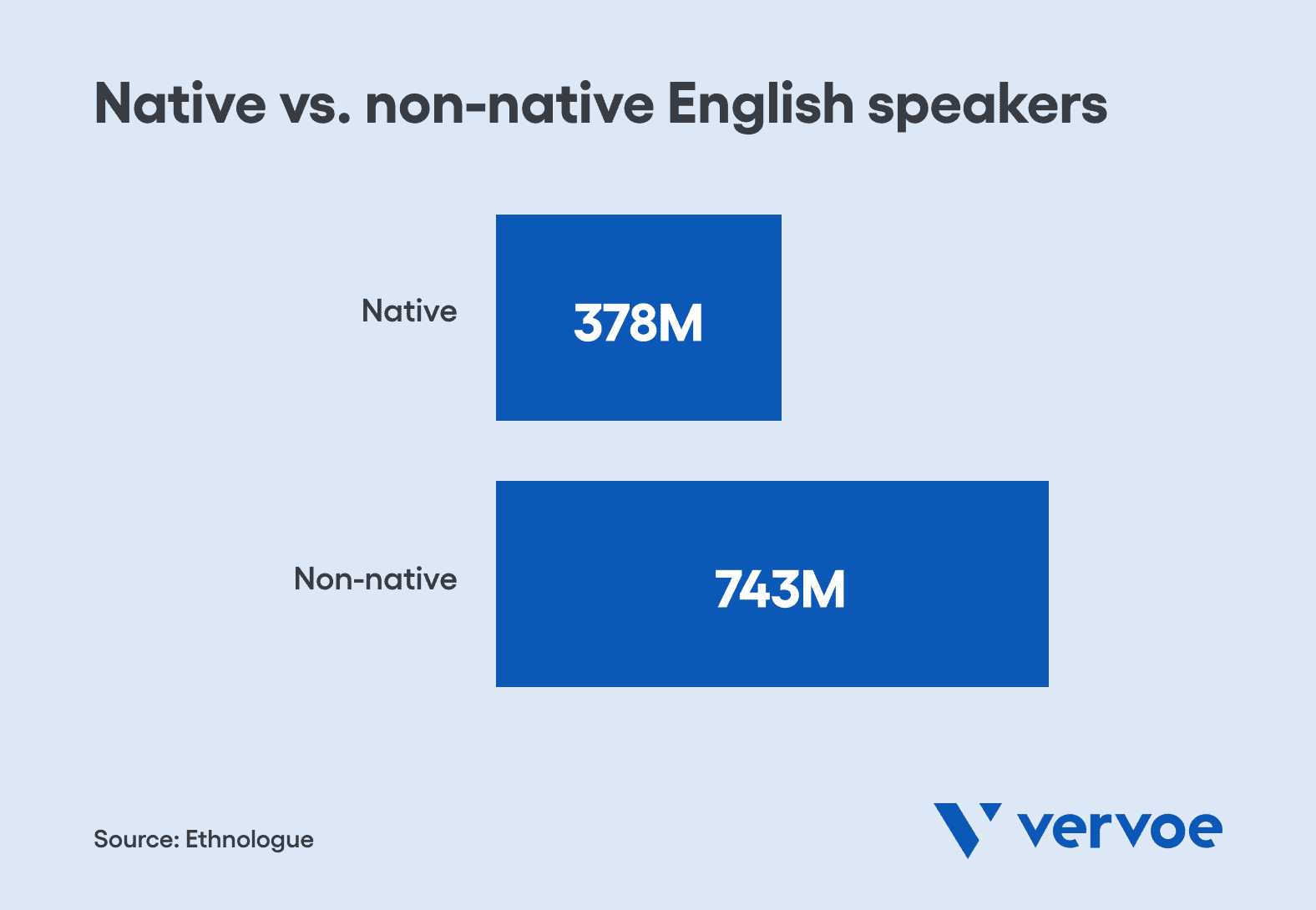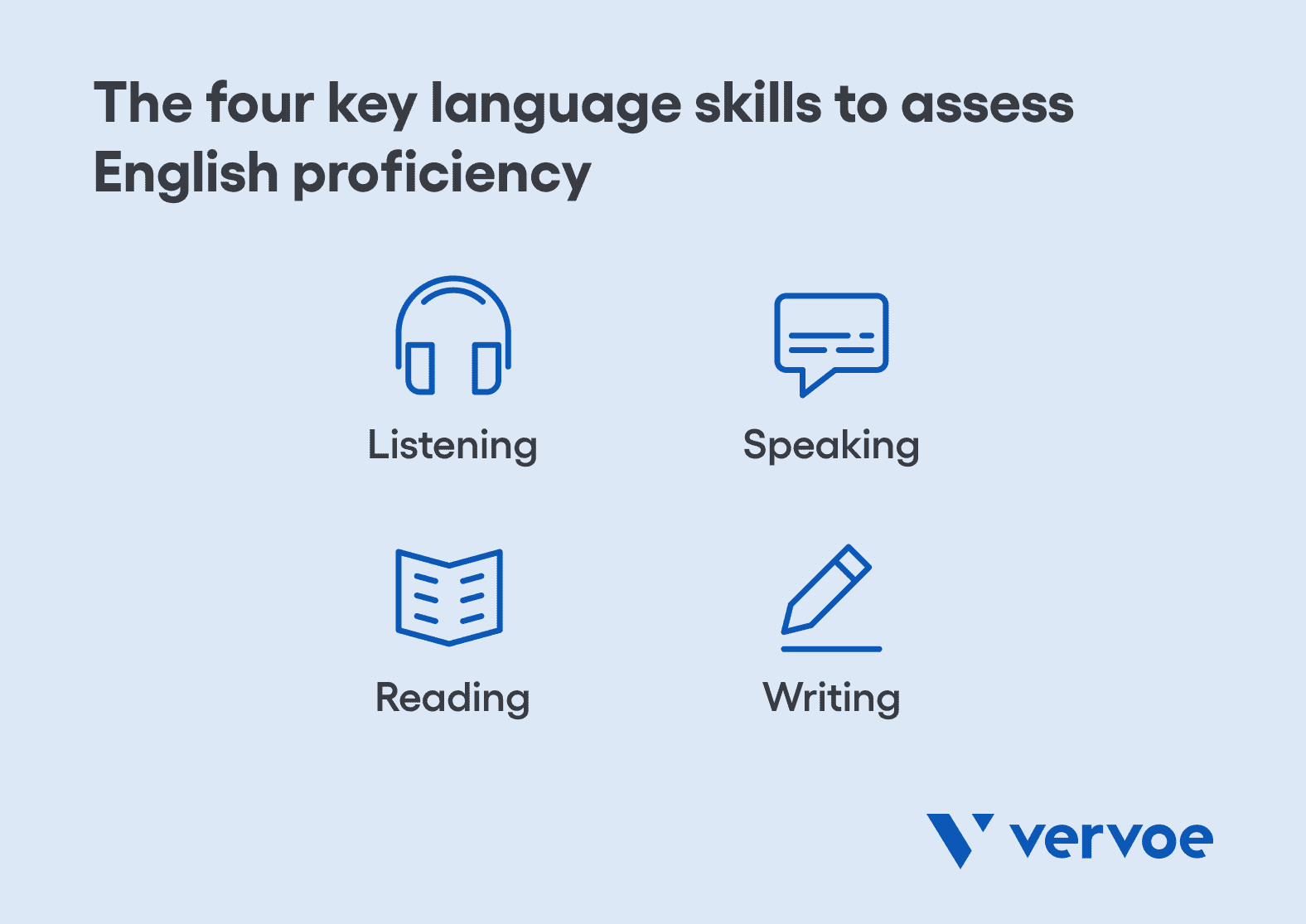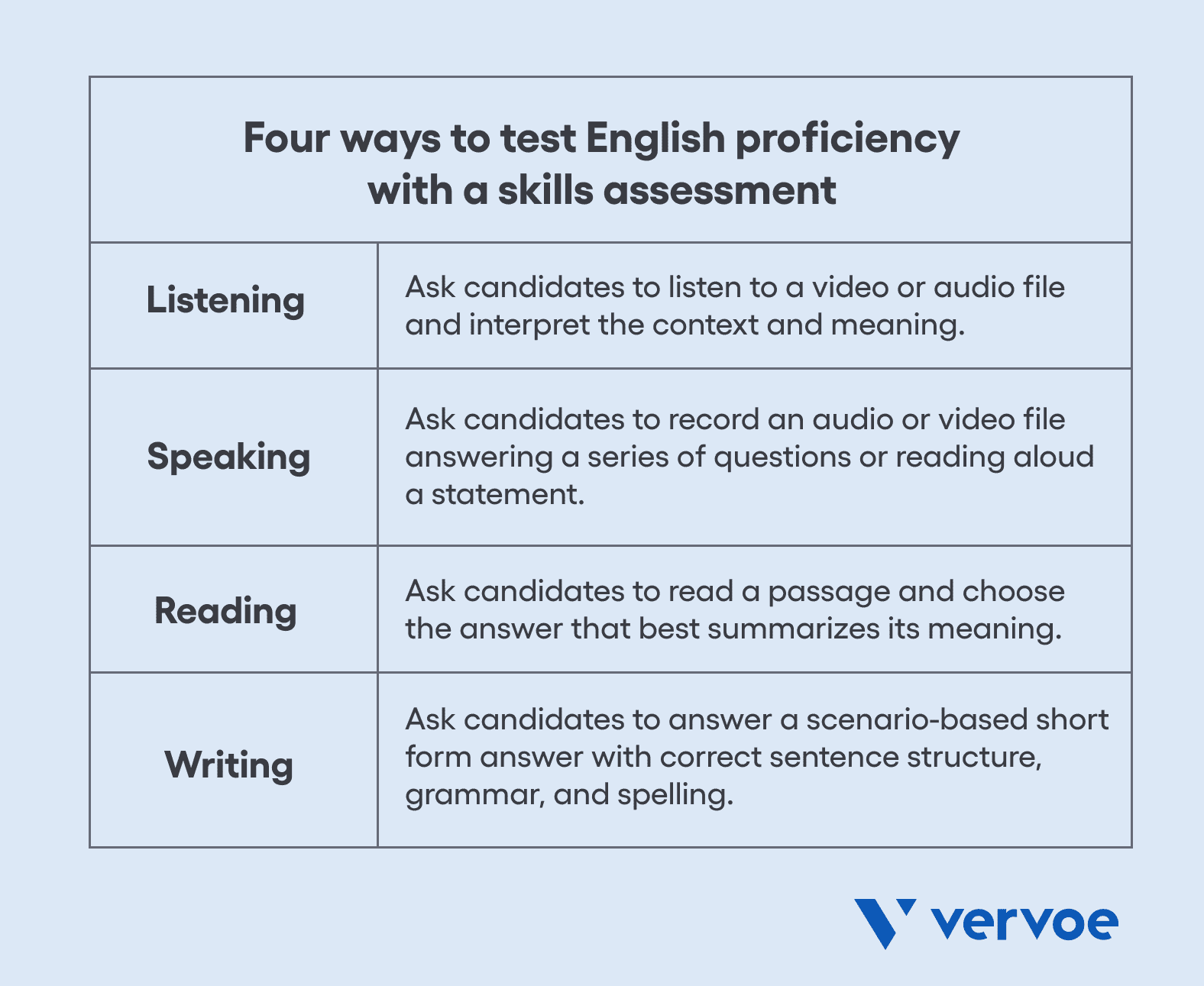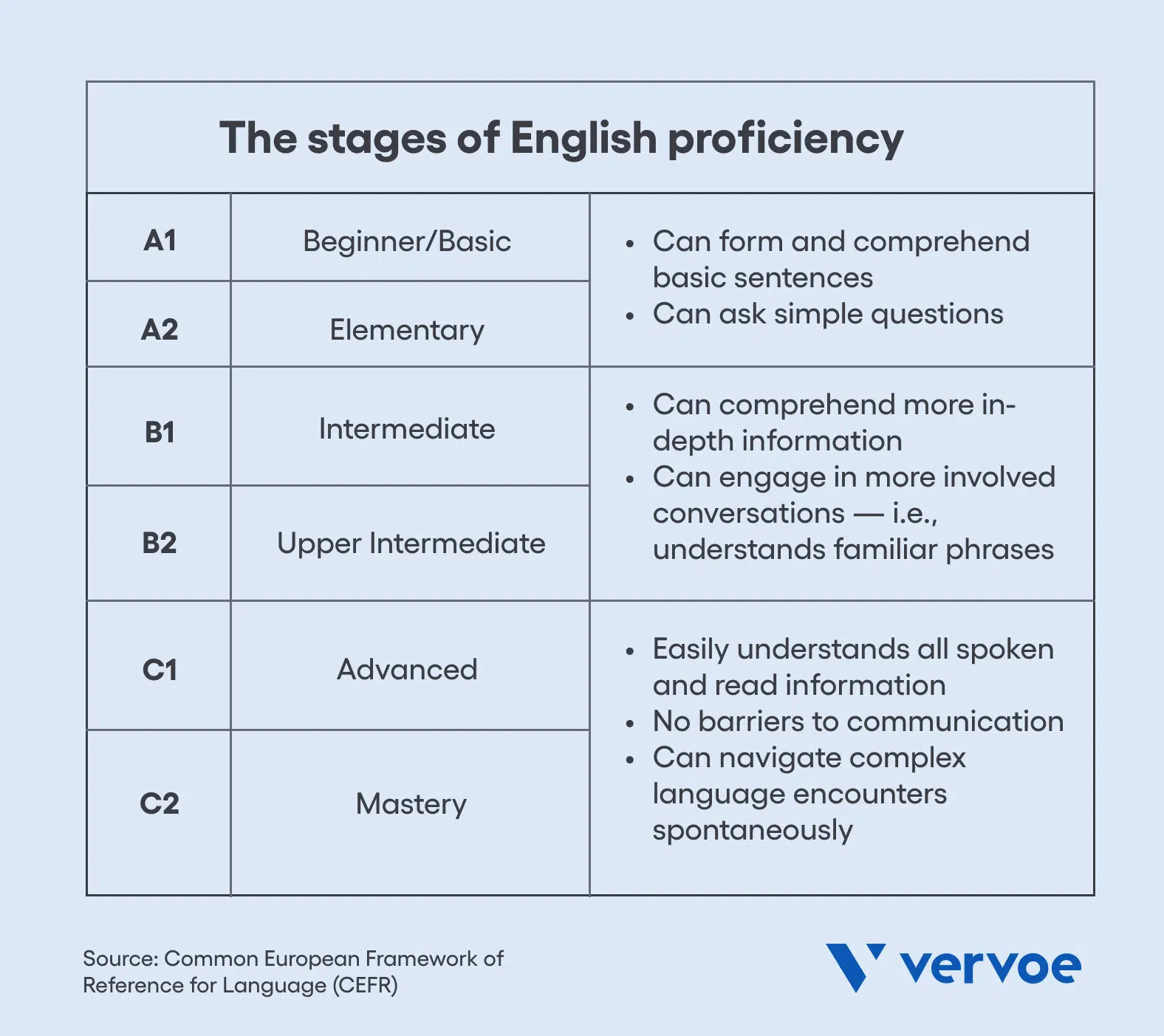The way organizations do business is changing.
Today, we’re operating in a global market with seemingly non-existent borders — where companies and candidates can function entirely remotely from opposite corners of the world.
And if the post-pandemic candidate scarce market has taught us one thing, it’s this: the ideal candidate may not speak English as their first language.
In fact, while it’s spoken by over 1 billion people globally, only 378 million speak English as their first language.

With a growing number of job seekers learning English to improve prospective employment opportunities, it’s equally beneficial for employers who can reap the rewards of bilingualism. This includes greater connection with international customers, improved workplace diversity, a better understanding of the global market, and more.
Yet, while the benefits are undeniable, the consequences can be just as impactful when organizations don’t test English proficiency before hiring.
In this article, we’ll delve into what language proficiency is and why it matters, the four skills encompassing English proficiency, and how Vervoe’s skills assessment platform can simplify your English test for employment.
What is a pre-employment English test?
A pre-employment English test evaluates a candidate’s proficiency across multiple aspects of the English language to assess if they meet business-level language requirements. This includes testing a candidate’s reading and writing comprehension, verbal communication, grammar, reasoning, and vocabulary.
A pre-employment English test is generally done early in the hiring process to ensure hiring managers direct their efforts toward candidates who meet the core requirements to succeed in the job.

Why is a pre-employment English test crucial?
Despite the global candidate shortage, some job seekers are still struggling to get a foot in the door — whether it be heightened competition in certain industries or unrealistic job requirements in others.
Often, this results in job seekers embellishing the truth about their skills and capabilities on their CVs just to get a look in. A 2018 CareerBuilder survey found that 75% of candidates lie on their resumes.
According to a Hloom study that surveyed 2,000 hiring managers, foreign language fluency is the second worst lie a candidate can make on their resume.
Yet, the same study found that candidates continue to lie for two main reasons:
- To be perceived as a better fit for the role (49.3% of respondents)
- To appear well-rounded and experienced (21.7% of respondents)
So, why does it matter? Hiring employees without assessing their language proficiency can be detrimental to business success. It increases miscommunication, impacts customer connection and experience, can lead to legal ramifications due to misunderstandings, and reduces credibility.
According to a Rosetta Stone report, 67% of employers admit that language-related miscommunication contributes to inefficiencies.
The four important language skills in the workplace — and how to test proficiency
When running an English test for employment, hiring managers look at four critical skills: listening, speaking, reading, and writing.
These four skills encompass all of the elements that make up a language and will determine if a candidate possesses the balance of skills required to carry out the duties of the role successfully.
A candidate must be capable in all four areas to be considered proficient. However, organizations may have an altering perspective on what ‘proficiency’ looks like in their workplace.
This may mean placing importance on specific skills over others in your English test for employment, depending on the nature of the role. For example, a customer service role will have different English proficiency requirements than a non-customer facing position, i.e., a landscaper or construction worker.
Let’s delve into the four essential skills that make up English proficiency, how they relate to business success, and how to test them.
1. Listening skills
What are listening skills in English proficiency?
Listening skills test a candidate’s ability to comprehend the language in spoken form. This includes a candidate’s ability to understand nuances, distinct oral expression mannerisms (i.e., speech patterns), accents, and potentially non-technical cultural terminology (i.e., slang words).
Why are English listening skills important in the workplace?
Generally, listening is the most important English skill as it exists within all business areas — from internal communication and business meetings to customer-facing roles that require deep connection and understanding. The listening skill is a fundamental requirement for a candidate to communicate effectively and understand the meaning behind the communication.
Listening is a fundamental skill to carry out the following tasks:
- Business meetings
- Customer service
- Phone conversations
- Zoom meetings
- Presentations
How to test English listening proficiency
Listening is a relatively easy skill to assess in your English test for employment. One of the most effective ways to determine a candidate’s listening skills is to have them listen to a pre-recorded audio file in English, followed by additional questions to assess how well they understood the conversation and the actions required.
This can be tailored more specifically to the communication styles unique to the role. For example, organizations can customize Vervoe’s English proficiency skills assessment to include questions that give the candidate a realistic job preview (i.e., A customer service position may consist of an audio task about a customer query). Additionally, multiple question types can be used in the assessment — including pre-recorded audio and video files — to assess the candidate’s ability to understand spoken English (audio), and mannerisms and body language (video).
2. Speaking skills
What are speaking skills in English proficiency?
English speaking skills are a candidate’s ability to maintain proper sentence structure and flow, correct pronunciation and intonation, clear articulation, a strong vocabulary, and the ability to carry out a conversation confidently.
Why are English speaking skills important in the workplace?
Much like listening, speaking is a critical skill required across every aspect of day-to-day business activities — from discussing internal requirements and business strategy to solving customer problems.
Speaking skills significantly impact internal communication and customer-facing roles, such as call centers, retail positions, and jobs requiring client/customer contact (i.e., account managers, teachers, doctors, administrators, etc.). Similarly to the listening skill, speaking proficiency is necessary to carry out the following tasks:
- Customer service problem solving and communication — in person, on Zoom, or via a phone call.
- Internal business discussions and teamwork.
Without adequate English speaking skills, there are likely to be miscommunications and misunderstandings, resulting in disgruntled customers, lower productivity and results, and ultimately, employee dissatisfaction.
How to test English speaking proficiency
There are a couple of ways organizations can assess a candidate’s English speaking proficiency:
1. A phone/video screen interview
The recruiter will set up an interview with the candidate and ask them a series of questions to evaluate how well they understand the question, how quickly they can form their responses, and how well they articulate and deliver their responses.
While easy enough to conduct, this type of English test for employment is more time-consuming as it requires the employer to assess the candidate manually and may introduce bias and subjectivity into the process.
Secondly, knowing where to place the language screening interview in the hiring process can be tricky. For example, if a recruiter places it at the top of the funnel, it will take longer to complete as more candidates will be screened. If it is placed at the bottom of the funnel, they may risk unnecessarily progressing a candidate who cannot fulfill the role’s duties, increasing time-to-hire.
2. A quality skills-based assessment
The recruiter can utilize external skills-based testing platforms, such as Vervoe, to assess candidates’ suitability for the role.
A Vervoe skills assessment can be designed to solely test a candidate’s English proficiency — either through a fully customized test that focuses on the English skills most significant to the role’s success or with a pre-designed English proficiency skills assessment. Or, the organization can weave an English test for employment into an all-encompassing screening assessment to test a job seeker’s soft and technical skills and English comprehension. Through Vervoe’s platform, running a pre-employment English test to assess a candidate’s English speaking skills will include various questions and tasks, such as:
- Candidates recording themselves reading aloud a written statement — to help assess articulation and comprehension.
- Candidates recording themselves answering specific questions — to help evaluate sentence structure and flow.
3. Reading skills
What is English reading proficiency?
An English reading proficiency test assesses a candidate’s understanding and interpretation of written information. This includes understanding the meaning of words and the context of conversations and situations.
Why are English reading skills important in the workplace?
A candidate’s ability to confidently read English is important for many reasons and at all stages of their employment. This may include the following situations:
- Before signing, new employees must comprehend the necessary details outlined in their employment contract.
- Employees need to understand written directions and tasks assigned by their Manager.
- Employees must interpret internal company documents (i.e., legally binding documents, company branding, etc.)
- Employees in customer-facing positions need to understand the meaning of written communications, along with their context, and emotion (i.e., a customer complaint email, a live chat inquiry, etc.)
- Employees who work entirely remotely in any field need to be able to interpret written correspondence
How to test English reading proficiency
There are several ways to run a pre-employment English test to assess a candidate’s reading comprehension. Through a skills-based platform, such as Vervoe, this may include providing candidates with a written passage and asking them to decipher its meaning with a multiple-choice response, which can also assess their grammar and punctuation, or a short-form answer to give them complete freedom over their interpretation.
This gives employers greater clarity of the candidate’s ability to break down the meaning of the language and to understand the context of the scenario.
4. Writing skills
What is English writing proficiency?
English writing proficiency refers to a candidate’s ability to construct concise, clear, and articulate sentences that flow, have meaning, and use correct grammar and punctuation.
Why are English writing skills important in the workplace?
Writing proficiency is crucial in connecting team members and customers across various industries and roles.
- Internally, this may include sending emails to stakeholders, writing internal reports, creating slideshow presentations, or crafting briefs for team members.
- Externally, it could mean writing professional, articulate, and consistent messaging to clients and customers via email or letter.
How to test English writing proficiency
An organization can easily assess English writing proficiency through a skills-based platform by asking candidates to complete various questions that test their grammar, spelling, and writing.
These include:
- Asking candidates to correct the spelling and punctuation in a written passage.
- Giving candidates a real job scenario that requires a written response. For example, a customer service role may require the candidate to draft an email response to a customer complaint using Vervoe’s customer service simulator.

What are the different stages of language proficiency?
The Common European Framework of Reference for Language (CEFR) is the most universally recognized measure of language proficiency. CEFR has categorized the stages of language proficiency into six levels, ranging from A1 and A2 (beginner), B1 and B2 (intermediate), and C1 and C2 (proficient).

It’s important to note that while all roles require candidates to possess knowledge and understanding of all four language skills, there may be greater emphasis placed on specific skills over others depending on the role’s requirements. For example, a live chat support desk role will prioritize reading and writing proficiency over listening and speaking.
As such, organizations must understand what language skills are imperative to the role’s success to ensure the assessment accurately reflects this.
For example, an in-store Retail Sales Associate role will require all four skills but not necessarily at the same level of understanding. Let’s break it down:
- Listening and speaking skills: Listening and speaking English skills are most important for the employee to successfully carry out the duties of the role. This will allow them to effectively communicate with customers — answering questions, problem-solving issues, and creating a positive store experience.
- Reading skills: Reading comprehension is essential for using the POS system, checking stock levels, reading labels, and interpreting internal notes or tasks. While still extremely important to the role, it’s less significant than being able to converse with customers confidently.
- Writing skills: This is the least essential skill required for the Retail Sales Associate role. While necessary for internal purposes (i.e., conversing with the Manager, leaving important notes at the end of a shift, etc.), it’s required to a lesser degree than the other skills.
4 reasons why you should use a Vervoe English proficiency skills assessment test
Running a pre-employment English test can be a time-consuming, biased, and ineffective process when done manually. It requires the recruiter to create assessments manually and grade candidates’ results based on their subjective understanding. And in some instances, it even requires the recruiter to manually run the English language assessment for the candidate (i.e., to assess listening and speaking skills) if resources and tools are non-existent.
Vervoe’s AI-graded skills-based assessments solve these issues by delivering a fair, accurate, and efficient solution to finding suitable candidates for the job.
1. Vervoe’s skills assessments save organizations time and money
Implementing Vervoe’s English proficiency assessment at the start of the hiring process helps eliminate unsuitable candidates early on so recruiters can focus on the candidates who meet their requirements rather than working out their test scores. This reduces an organization’s time-to-hire and cost-to-hire. The speed of Vervoe’s AI grading also supports this, screening 10,000 candidates in the same amount of time it takes a recruiter to manually screen one.
2. Vervoe’s skills assessments are fully customizable
Vervoe’s skills testing platform is entirely customizable to suit the unique requirements of every role at every organization. Vervoe’s English proficiency tests can be incorporated into a custom skills-based assessment, whereby English proficiency and job-ready skills are evaluated in one in-depth assessment. Alternatively, it can be used as a standalone assessment — i.e., our pre-designed English Proficiency Skills Assessment or a singular customized assessment — to solely assess English skills.
Vervoe’s English proficiency assessments are most effective when customized to include questions that mimic realistic responsibilities within the role to create a job simulation. Organizations can use various question types — presentations, spreadsheets, video, audio, multiple choice, short answer questions, and more — to assess the suitability for the role of test takers while giving them a realistic job preview.
3. Vervoe’s skills assessments are AI-graded to ensure accuracy and efficiency
Vervoe’s intuitive AI-grading removes the tedious task of manually reviewing assessments and the bias that may seep into the equation when grading. Vervoe’s AI will grade and rank the assessments — including multiple choice, text-based, and video and audio answers — according to your preferences and by benchmarking the responses against thousands of other candidates and millions of other responses in our database to improve accuracy.
4. Vervoe’s skills assessments can screen a high volume of applicants
Vervoe’s skills-based assessments can be sent to a high volume of candidates and automatically graded with AI to help streamline the process. This gives complete confidence that the candidate selected is the best person for the role.
You can scale your marking of grammatical errors, and assess multiple skills in an automated fashion, and focus on the top ranked candidates the AI spotlights. Then any marking you do will feed into the knowledge base of our machine learning AI, and marks will adjust based on what it learns from you. Constantly iterating to predict test taker marks more accurately, and allowing you to scale your hiring confidently.
Final thoughts
English is the most widely spoken language in the world — and funnily enough, most English speakers have learned it as a second language.
Candidates worldwide are looking for opportunities to progress their careers in countries or companies that prioritize the English language. For organizations, hiring bilingual employees boasts various benefits — including deeper customer and client connections and a greater understanding of the global marketplace, both of which can positively impact a company’s success.
Yet, the potential bottom-line benefits are only possible if the employee has a proficient understanding of English. Thus, proving the need for pre-employment testing to assess candidates.
Utilizing a skills-based assessment platform, such as Vervoe, is an effective way to evaluate a candidate’s speaking, listening, reading, and writing English skills as they relate to the requirements of the role. This includes opting for a customized skills-based assessment unique to your organization’s needs or a pre-designed one to ensure all candidates meet the requirements.
Check out our pre-configured English Proficiency Skills Assessment and explore our library for more options to customize your skill tests.




















